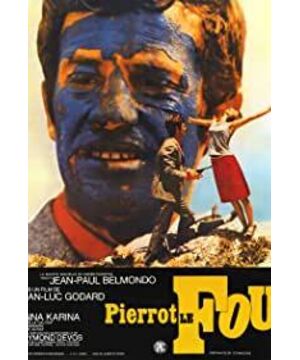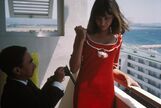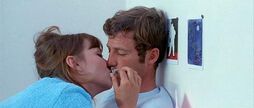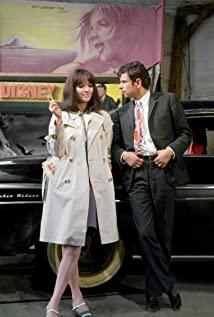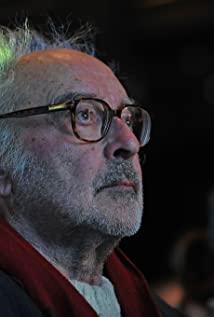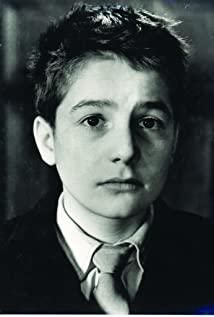So read it again. English subtitles. I understand a little bit.
About marianne when
she first appeared, her hair was so neatly combed that she looked like a schoolgirl. so cute.
Then Pierrot ran off with her.
In the car, she said to Piero,
that's what makes me sad: life is never what it's written in the books. I want them to be the same, clear, logical and organized. Not so.
Then their conversation -
i'll do Anything you want.
Me TOO, Marianne.
I'm putting your My Hand ON KNEE.
Me TOO, Marianne.
I'm Kissing you All over.
Me TOO, Marianne.
So Pierre Luo left his wife and went with her. With this somewhat mysterious girl. She says she's not a mystery, "I just don't like talking about myself," she said.
They just went through France like a shadow through a mirror. She's slim and graceful, and I don't understand why she loves Pierrot. She said: I know I love you, but I don't know if you love me. But Piero looked at her like that... They were arguing, she said she didn't actually fight him about buying records, she didn't even care about money, she just wanted to live. But he will never understand.
On the beach they huddled together intimately. Pierrot asked, why do you look so sad?
Answer: Because you speak to me with words, and I look at you with feelings.
Pi: Never been able to talk to you. You never have thoughts, only feelings.
Answer: That's not right! It feels like there is an idea in it!
Then they stopped arguing, promising to do everything for each other and stroking the parrot's fur together.
When they lived by the sea they kept a fox, grey and yellowish, with big, pointed ears. marianne stroked it and spoke to it with a pointed mouth. The fox is very small, with big eyes, and looks extremely gentle and shy. While they were arguing, the fox sat there, looking around uneasily.
marianne, she can smash someone's head neatly with the front cover of a wine bottle. She can kill someone with a small scissors, and she can also use a gun. But she was like a little girl, singing and dancing. And she always carried a dachshund puppet and took it wherever she went, twirling it around by its tail. I'm a little curious where the dachshund was when she killed her.
Maybe she did love Pierrot, I don't know. She seemed to say to him seriously: Why don't you always believe that I love you? I love you in my own way. As proof, you see, I went to our seaside to retrieve your diary, look at the last page, I wrote a short poem for you.
Pierrot then became happy and read the poem. Then they happily ran away.
What is her relationship with fred, I don't understand. There seems to be fear, but if there is only fear, why bother looking for him? I'm afraid she also has feelings... So can she love two people? do not understand. I find that there are too few things I can understand...
about Piero
actually he is not called Piero. Every time marianne calls it that, he corrects, no, my name is Ferdinand. But it doesn't really matter...
Once upon a time he taught Spanish. That's when he met marianne, who later married a rich Italian woman and had children. Reuniting with marianne made him leave everything behind, be a thief, and wander. He always kept a diary, liked literature, liked painting, liked to imagine.
I guess he loves marianne because he feels alive with her. Life before was nothing short of walking dead. Most people are doing The Walking Dead and having fun...but he can't.
He really loves her.
His monologue -
we no longer need mirrors to talk to ourselves.
When marianne said: "It's a good day.
I wonder what she was thinking.
All I can know is this picture: It's a good day, she said.
Nothing else.
What's the point of figuring it all out?
We are made of dreams, and dreams are made of us.
It's a good day, my love.
In dreams, in words, in death.
It's a good day, my love, it's a good day in life.
He was separated from her, and he thought he had lost her. So I sat on the rails. Just dodged the moment the train came. Then she came, and he said a little bewilderedly: I don't know... the color of the sky, our relationship... I don't understand.
But she said she loved him, and he believed it so easily. With her he was like a child, reading aloud happily, jumping up trees and houses.
So when he felt that marianne might not love him anymore, he killed her, with a gun.
And then repeatedly said, this is what you asked for, this is what you asked for.
Then he painted his face blue, ran out, howled like a beast, and said "why" by the sea, then tied the explosives around his head and set it on fire.
The ending
explosion is over. The camera turns to the other side.
A quiet sea, and then the sun.
Marianne's voice -
we are together again. forever.
No, just the sun, and the sea.
As for the director (quote),
just like the other technical characteristics of modernist films have their representatives, it is probably the most appropriate to take Godard as a representative of a certain "destroying aesthetics".
Godard was originally a film critic for the French "Cinema" magazine. From 1959, when he made his first feature film "Exhausted", he made fifteen feature films and several in nine years. short film. Beginning in 1968, Godard's ultra-left thinking led him to the conclusion that he could no longer make films for "bourgeois audiences", so he would no longer make commercial films, but instead made some "for the working class" ", in fact, no one can understand the film. As for the fifteen feature films he made in the first nine years, Reitz believes that "except for a few real connoisseurs, most people don't quite grasp the mystery".
Godard's extreme disdain for traditional technique was the main reason that made him a sensation in the Western film industry in the 1960s and 1970s. Amis believes, "In every sense, the films of the 1960s were Godard's, and he modernized them." Henri Langlois, director of the French Film Archive, even exaggerated to say that if the history of early cinema can be If it is divided into pre-Griffith and post-Griffith, then contemporary films can also be divided into pre-Godard and post-Godard. There are a lot of people who don't appreciate him. Commenting on his oeuvre in the New York Times, American film critic John Simon said, "In Jean-Luc Godard's films, everything is left behind: meaning, communication, effective form, men, Women or life. Even the spirit of revolt for greater liberty, which has never been seen in the avant-garde movements of the past, is left behind. Godard's revolt is only to satisfy childish indulgence. In his work , the feelings are all false, the jokes are just rude expressions, and the activities have no reason.. Godard obviously didn't know what he wanted to achieve in his scenes, films and even all his works, so he was rash Losing ground and marching in all directions at once. It is an act of arrogance, irresponsibility, madness and folly." Other Khanists against Godard agree that his aesthetics of destruction are nothing more than acquiescence I just lack the ability to tell stories.
So, what destructive techniques did Godard use?
The first of course is the so-called jumper. There are also examples of jumping in other modernist films. In "The Four Hundred Blows", Truffaut deliberately cut out the middle process of Antoine's father walking from the room to the kitchen, so that the one on the left corner of the screen is cut off. The cat suddenly "jumped" to a slightly different position. But Godard's jumper was even more bizarre. For example, in "Exhausted" a car going right to left would suddenly turn left to right, and a truck being chased would suddenly disappear. He can turn a tragedy into a farce without hesitation, and can connect different tenses together. In Piero the Madman (1965), time flies especially fast, with the present and future tenses appearing in succession while the place remains the same.
The exact opposite of a jumper is "extra lens". The so-called "superfluous shot" is to insert some irrelevant shots in a continuous action. Most of Godard's films are set in public places (cafes, streets), and he often makes the camera "dangling" for no reason, and some "superfluous shots" interrupt the continuous action, resulting in "unsmooth" editing. In the opening scene of Men, Women (1965), a couple quarrels and fights in the cafe where the hero and heroine of the film meet, the wife chasing her husband for a big title and pulling out in front of her son Shooting her husband to death. But this atrocity has nothing to do with the subsequent development of the film. From the traditional concept of plot development, it is purely "superfluous".
"Self-involvement" and "talking about" are the extreme means Godard uses to destroy the art of cinema more completely. Godard called his film a "cinematic treatise", a "fourth kind of film" different from the "three traditional films" (story film, documentary film and experimental film). He said, "I see myself as an essayist: I write essays in the form of novels, novels in the form of essays, and in short, I photograph them, not write them." Since it is a "thesis", you can directly To tell your own point of view, you can put all kinds of abstract materials in the film, and talk about it through the characters in the film, talking nonsense, and often digressing. In "One or Two" (1966), he hides a small microphone in the heroine's hair, and he stands behind the camera and asks her questions. She is not allowed to speak, but only replies with expressions. He guesses what she means, Continue the discussion with her. In "Lai Huo" (1962), the philosopher gushed about what language is. In Contempt (1963), a film director talks about the joys and sorrows of being a director. The characters in his films are talkative, on topics ranging from pop culture to the deepest philosophies. His films are filled with words -- spoken, written and even sung. Godard wants the audience to always remember that they are watching a movie, because only when a person is awake can he correctly judge the meaning of what he sees. From this point of view, Godard seems to be trying to use Brecht's "distancing effect" theory in the creation of the film, which is to try to keep the audience emotionally distanced from the people in the play and avoid falling into the ecstatic identification. But Godard obviously pushed the theory of "distancing effect" to the extreme, and it was not the illusion of the audience that was destroyed, but the art itself.
Godard's subjective and arbitrary methods make his films a free combination of fragments. Godard has said that he himself can't explain why he uses this or that technique, and he uses an improvised way when filming, and he doesn't know what the purpose is. But none of his films reflect his existentialism (he is known as an "existentialist Marxist" in the Western film industry ). He has a pessimistic view of the world and does not believe in the possibility of a real exchange of ideas and feelings between people, so as Reitz said in his review of his films, "We can only think that film language like this is a It's a way of expressing the anguish that comes from the failure of the desire to make our world into a more perfect image."
About the film itself,
there is an American director at the party at the beginning, when asked what to do, he answers, love, hurt... in short, emotions. Perhaps Godard speaks his mind through the character's mouth. Isn't that the case with this movie? The plot is very simple, and even some details may not make sense, this is not a melodrama. What he shows you is emotions, people's love, unloving, doubt, pain and despair.
The film is interspersed with information about the Vietnam War. This movie was made in 1965, so let's remember a few things. It is not difficult to see Godard's attitude towards war. He used marianne's words to express his dissatisfaction with war's contempt for human beings and easy to erase the meaning of human beings. He asked Pierrot and Marianne to perform the so-called "Uncle Sam's nephew and Ho Chi Minh's niece". ', performed for American soldiers and simulated bombers with lit matches. He made Pierrot put on an American soldier's hat, made a frivolous gulping drink, and grinned and said, "oh yeah! hollywood!"
He also likes to express his views on literature and art in movies. Commentary by the interlocutor who read aloud, a hoarse monologue by Pierrot on the literary expression of man, time, space and their interrelationships, Joyce.
Sometimes he inserts such a paragraph, and doesn't seem to care if it has anything to do with the theme of the film. That's what makes the film even more bizarre, kind of absurd but moving. Pierrot and marianne squatted on the side of the road, Pierrot pointed to a Van Gogh painting and said, I saw the pub where Van Gogh cut off his ears. Then they stole a car.
I might understand Pierrot, to a degree. But I can't understand marianne. Godard's films are famous for being difficult to understand, so it's normal for me not to understand, I console myself. It's incredible to
finally turn to a connoisseur's film critic
. Pierrot is not Pierrot, but Fernand. Of course he's a lunatic, but he's madly in love with Marianna, but Marianna feels bored. Pierrot followed Mariana (running, of course) to the south, to the sea. Towards death, to the table sun, in brilliant colors.
This is not a picture of a violent world, but a violent picture of a world. Always alluding to political scandals. A free tone, a dashing improvisation, and a weight and beauty of imagery that has not yet been seen in French cinema. "Crazy Pierrot" is a harrowing love story and, in a sense, a poem from a shadowy one. torn apart. full of madness. Distilled poetry in a world of adventure and violence, he tries to decipher an unintelligible mystical system - the behavior of women. There is even a kind of anger in it, some people will see it as the kind of rage that only shrews have, but in reality, it is just a vent of deep hurt. I can't find anything in the newspapers, Bell** said that his method of seducing women is to start by never sending flowers. Truly the words of a wise man. His personality, here, reflects his openness, when in the final analysis, his personality and openness are the same thing. Of course his approach failed miserably. The object of temptation - the woman - is left to the poet Bell**, who himself has been secretly fascinated by his charm, and may have received his compliments. He can speak, and there is a romantic passion in his words. He gushed. You will laugh at him, women prefer a rude guy, a tough guy who dares to act, rather than someone like him. Then, let him die. (Omitted) Smart and subtle, emotional, mysterious and unpredictable. Yes, that's how the film was shot. He has all the charisma and technique of an action movie, like rough, fast; it has all the beauty of a comedy, like jokes, banter, plus it has the kind of poetry that can't be read without taking it apart. The sad beauty of a letter.
Pierre Kast. Excerpted from Paris Lookout, November 3, 1955,
White Bear 05 01 08
View more about Pierrot le Fou reviews


